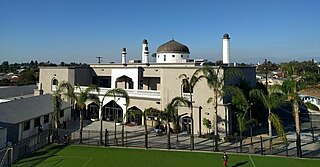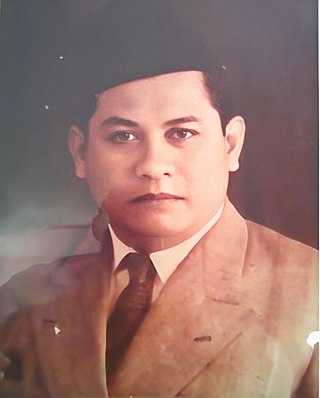A mosque, also called a masjid, is a place of worship for Muslims. The term usually refers to a covered building, but can be any place where Islamic prayers are performed, such as an outdoor courtyard.

Islam is the largest religion in Indonesia, with 87% of the Indonesian population identifying themselves as Muslims, based on civil registry data in 2022. In terms of denomination, the overwhelming majority are Sunni Muslims; the Pew Research Center estimates them as comprising ~99% of the country's Muslim population in 2011, with the remaining 1% being Shia who are concentrated around Jakarta and about 400,000 Ahmadi as well. Indonesia is the most populous Muslim-majority country.

South Africa is a Christian majority nation with Islam being a minority religion, practised by roughly 1.6% of the total population. Islam in South Africa has grown in three different phases. The first phase brought the earliest Muslims as part of the involuntary migration of slaves, artisans, political prisoners, and political exiles from the Dutch East Indies to the Cape Colony from 1652 to 1800. The second phase was the arrival of indentured labourers from British India to work in the sugar-cane fields in Natal from 1860 to 1911. Of the approximately 176,000 Indians of all faiths who were transported to the Natal province, almost 7–10% of the first shipment were Muslims.

The Barelvi movement is a sect that generally adheres to the Hanafi and Shafi'i schools of jurisprudence, and Maturidi and Ash'ari schools of theology with hundreds of millions of followers, and it encompasses a variety of Sufi orders, including the Chistis, Qadiris, Suhrawardis and Naqshbandis as well as many other orders of Sufism. They consider themselves to be the continuation of Sunni Islamic orthodoxy before the rise of Salafism and Deobandi movement.
The Fiqh Council of North America is an association of Muslims who interpret Islamic law on the North American continent. The FCNA was founded in 1986 with the goal of developing legal methodologies for adopting Islamic law to life in the West.

The Muslim World League is an international Islamic NGO based in Mecca, Saudi Arabia that promotes what it calls the true message of Islam by advancing moderate values that promote peace, tolerance and love.

The Grand Mosque seizure in Saudi Arabia took place between 20 November 1979 and 4 December 1979, when the Grand Mosque of Mecca was besieged by up to 600 militants under the leadership of Juhayman al-Otaybi, a Saudi anti-monarchy Salafi Islamist from the Tribe of Otaibah. They identified themselves as "al-Ikhwan", referring to the religious Arabian militia that had played a significant role in establishing the Saudi state in the early 20th century. As they took hostages from among the worshippers at the holiest Islamic site in the city of Mecca, the Ikhwan called for an uprising against the House of Saud and also declared that the Mahdi had arrived in the form of one of the militants' leaders: Muhammad Abdullah al-Qahtani. Juhayman alleged that the House of Saud had become corrupted, decrying their pursuit of alliances with "Christian infidels" and stating that the Saudi government's policies were betraying Islam by attempting to push secularism into Saudi society. Seeking assistance for their counteroffensive against the Ikhwan, the Saudis requested urgent aid from France, which responded by dispatching advisory units from the GIGN. After French operatives provided them with a special type of tear gas that dulls aggression and obstructs breathing, Saudi troops gassed the interior of the Grand Mosque and forced entry. They successfully secured the site after two weeks of fighting, which culminated in approximately 800 casualties in total.

The holiest sites in Islam are predominantly located in the Arabian Peninsula and the Levant. While the significance of most places typically varies depending on the Islamic sect, there is a consensus across all mainstream branches of the religion that affirms three cities as having the highest degree of holiness, in descending order: Mecca, Medina, and Jerusalem. Mecca's Al-Masjid al-Haram, Al-Masjid an-Nabawi in Medina and Al-Masjid al-Aqsa in Jerusalem are all revered by Muslims as sites of great importance.

The Islamic Society of Orange County, incorporated on January 5, 1976, is one of the largest Muslim centers in the Western Hemisphere, with almost 7,000 worshipers. It is located on approximately 5.2 acres (21,000 m2) in Garden Grove, California. It is neighbored by the Islamic Center of Irvine. Its director, Dr. Muzammil Siddiqi, is a scholar of Comparative Religion who received his Ph.D. from Harvard University. ISOC is one of the first Muslim centers to be established in Southern California.
Islam is an Abrahamic monotheistic religion teaching that there is only one God (Allah) and that Muhammad is His last Messenger.

Khalifa Ezzat was born in Bani Sweif, south of Egypt where he first received his Islamic education in the local Al-Fahsn Institute of Al Azhar located in Al-Fashin City. It was the custom of the Saft Al-Urafa community, to enrol the able and bright students for Qur'anic memorisation. Khalifa, began memorising the Qur'an, from his teachers Sheikh Husain, then his son Sheikh Muhammad, then Sheikh Sayyed Othman.

Muhammad Tānī was an Ethiopian Muslim cleric, scholar, teacher and political leader.

KH. Muhammad Dahlan 14 Jumada al-Ula coincide with 1327 Hijri, in the village of Mandaran, Rejo, Pasuruan, East Java. Muhammad Dahlan was the third son of five children. His Father was named Dahlan Abdul Hamid and his mother was Chamsiyah. Dahlan's village is located on the coast, approximately three kilometers from the town of Pasuruan. Together with his eldest brother, he diligently followed the study groups as previous scholars who follow the teachings around the courtyard of Masjid Al-Harram Mecca. In the holy city he studied various religious sciences, and got to know the outside world in general that would be a provision in building his country, especially when doing business with the Nahdlatul Ulama. Dahlan appearance in the arena movement began in 1930. He is the figure who pioneered the establishment of NU Bangil branch, and also become its chairman. Five years later he was elected chairman of the NU branch of Pasuruan.

The Islamic Society of Greater Houston (ISGH) is a system of mosques in Greater Houston. It is headquartered at the Eastside Main Center in Upper Kirby in Houston.

Imam Shamsi Ali is a prominent Indonesian Muslim Scholar known for promoting interfaith dialogues among Abrahamic Religions in United States and the Chairman of the Al-Hikmah Mosque and the Director of Jamaica Muslim Center in Jamaica, Queens, New York City.

The Islamic Center of Southern California is a mosque and Islamic cultural center located in Los Angeles, California. It is located on Vermont Avenue adjacent to the Chinese Consulate General in the Wilshire Center neighborhood of Los Angeles. It is one of the largest mosques in Southern California with thousands praying there every Friday. Although the institution dates back to 1952, the center's current mosque opened in the late 1970s.

Sayyid Ibraheem Khaleel Al Bukhari is founder and chairman of Ma'din Academy and adviser of World Interfaith Harmony Week. He is a sunni Islamic scholar, Joint Secretary of Samastha Kerala Jamiyyathul Ulama, General Secretary of Kerala Muslim Jamaat, a body of various Muslim organizations in Kerala and he is listed in The Muslim 500.
Tahir Mehmood Ashrafi is a SRPM for middel east and islamic countries
Muhammad bin Abdullah Al-Sabil, was born in the city of Bukayriyah in the Al-Qassim Province. He was the imam and preacher of the Masjid al-Haram for forty-four years in general, a member of the Council of Senior Scholars, and a member of the Islamic Fiqh Assembly, and the head of the Al-Masjid al-Haram and Masjid al-Nabawi affairs, and the head of the Al-Haram Committee in the Kingdom of Saudi Arabia. He is one of the hostages who survived the incident of the Juhayman armed group storming the Great Mosque of Mecca, when the sabil was the imam, led the people in the Fajr prayer.













